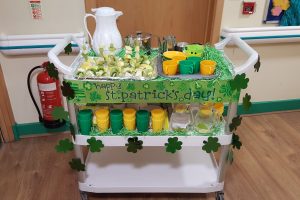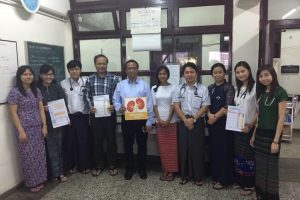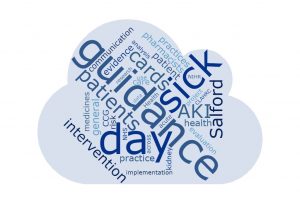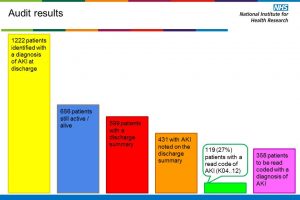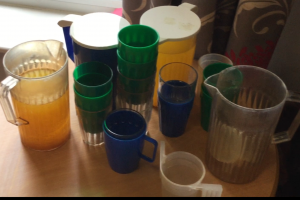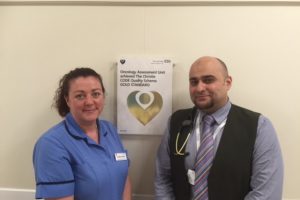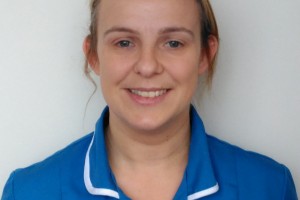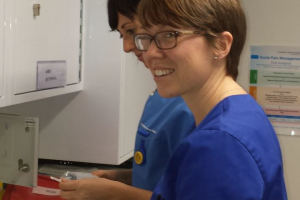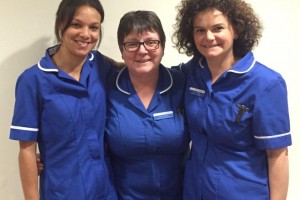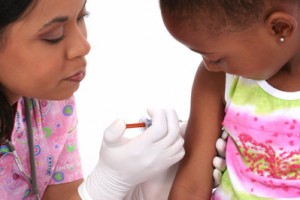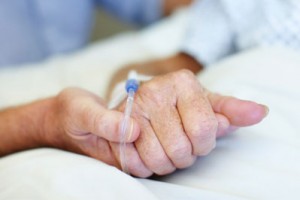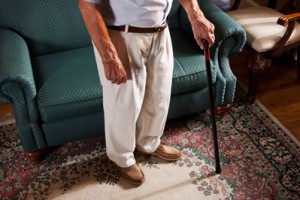Case studies
Starting from the beginning with a new AKI service at Bournemouth
Share this on – Facebook / Twitter / Linked In


This case study is our story of setting up a new service. In August 2014 Stephen Trowbridge, Diabetes Nurse Specialist undertook the challenge or developing a grass roots service for the management of in patients with Acute Kidney Injury (AKI) at The Royal Bournemouth Hospital (RBH). There was no existing service prior to this and with local and national statistics highlighting increased mortality and length of stay for our patients, innovation was required.
The first month was spent evaluating annual audits carried out over the preceding four years to identify common themes and to carry out our own assessment of the current care provided by all health professionals. We then set about developing an audit tool which would also act as a care plan when evaluating patients. Pathology would electronically e-mail blood results and AKI staging daily, and from that list we would filter appropriate patients and visit them on the wards.
During ward visits there were areas of management that could be improved upon. These are highlighted in three areas below.
1. Educational domain
- Allied health professionals on all wards were offered education on the management of AKI in 30 min ward based sessions. This was over 3-4 sessions to ensure opportunity for all staff to attend
- AKI has been added to the education programme for health care assistant induction training, return to nursing training , oversees nurse recruitment training and foundation training for medical staff
- A patient education worksheet has been developed to raise awareness of AKI with patients. It is given out before discharge and incorporates feedback from community nurse education sessions to include AKI staging, tests undertaken on admission, brief care/action plan for future management and a pathology form for future blood tests
- Regular visits to GPs and community teams to promote the management of AKI in primary care. Following feedback we developed pragmatic workable pathways for day to day management. Particular emphasis was placed on management plans when AKI staging alerts are live to the community 2016
- Organised workshops for community team education
- Set up an AKI specialist nurse forum for nurses new to the AKI role in the South East meeting at Southampton
2. Clinical domain
- Three Luminous pink stickers have been produced as a visual alert for patients with AKI on wards. One is the size of a postage stamp and is placed on all prescription charts to ensure appropriate prescribing. The other two are credit card size; one is a summary of a care bundle we have generated that is placed in the notes when patients are assessed; the third is a care escalation sticker to inform visiting teams and critical care outreach of appropriate patient movement and care pathways
- An AKI management care bundle and prescribing tool has been developed in A4 size, laminated and placed on all ward notes trollies for ease of access on ward rounds
- A pink paper, A4 size bold text AKI reminder highlighting in bullet points appropriate prescribing and AKI nurse contact details is placed in patient notes in front of admission pathology page where it will be seen daily when blood results are entered.
- Patients with stage 1 AKI are highlighted to all visiting professionals by luminous stickers placed on patient notes by ward based pharmacists. These patients do not receive an assessment by the AKI nurse
- Patients with Stage 2 and 3 are visited daily by the AKI nurse and receive a physical assessment .Where necessary urinary catheters will be inserted, fluid charts started or numerically totalled with RSU sampling. Vascular catheters will be inserted for recommended fluid maintenance and documented action plans will be placed in notes with recommendations care of a proforma
- Regular liaison with nephrologists and attend ward rounds when referrals have been made
- Specialist nurse is available on a bleep system Monday to Friday
3. Professional Domain
- We have been asked to present our innovation to NHS England in a conference organised by Wessex Nephrology forum in April 2015 with posters, presentations and workshops
- Two posters accepted at NCEPOD (National confidential enquiry into patient outcomes and death) UK conference in London July 2015
- Three monthly attendance to Wessex nephrology forum
- We have received requests from Dorchester, Southampton, Portsmouth and Leicester University Hospitals to allow their newly recruited AKI nurses to spend a day at Bournemouth to assist in their professional development and service set up, and work towards development of a job role specification document
The next work stream is to work closely with our primary care colleagues to ensure our patients receive early and prompt treatment and management of existing AKI and look at risk prevention in the community. We also aim to develop a rapid access renal review clinic to ensure our patients at RBH who are medically fit for discharge, can and seen by a specialist who can plan and follow up their care.
Stephen Trowbridge, Acute kidney Injury and Diabetes Nurse Specialist, Royal Bournemouth Hospital NHS Trust, Stephen.trowbridge@rbch.nhs.uk, 01202 704763
Case studies


